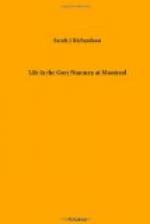To prepare for this, I was clad in a white dress and cape, and a white cap on my head. I was then led to the chapel, and passing up the aisle, knelt before the altar. Priest Dow then came and stood before me, and taking from a wine-glass a small thin wafer, he placed it upon my tongue, at the same time repeating some Latin words, which, the Superior afterwards told me, mean in English, “The body and blood of Christ.” I was taught to believe that I held in my mouth the real body and blood of Christ. I was also told that if I swallowed the wafer before it had melted on my tongue, it would choke me to death; and if I indulged an evil thought while I held it in my mouth I should fall into A Pool of blood.
CHAPTER III.
The nursery.
While in the White Nunnery, I spent the most of my time in the nursery. But the name gives one no idea of the place. The freedom and careless gayety, so characteristic of other nurseries, had no place in this. No cheerful conversation, no juvenile merriment, or pleasureable excitement of any kind, were ever allowed. A merry laugh, on the contrary, a witty jest, or a sly practical joke, would have been punished as the most heinous offence. Here as elsewhere in the establishment, the strictest rules of silence and obedience were rigidly enforced. There were twenty little girls in the room with me, but we were never permitted to speak to each other, nor to any one except a priest or a Superior. When directly addressed by either of them we were allowed to answer; but we might never ask a question, or make a remark, or in any way, either by looks, words, or signs, hold communication with each other. Whenever we did so, it was at the risk of being discovered and severely punished. Yet this did not repress the desire for conversation; it only made us more cautious, artful, and deceptive. The only recreation allowed us was fifteen minutes’ exercise in the yard every morning and evening. We might then amuse ourselves as we chose, but were required to spend the whole time in some kind of active exercise; if one of our number ventured to sit still, we were all punished the next day by being kept in the house.
It was my business, while in the nursery, to dust all the furniture and the floor, with a flannel mop, made and kept for this purpose. The floors were all painted and varnished, and very easily kept clean.
Two hours and a half each day we spent with a priest, whom we were taught to call Father Darity (I do not know as I spell this and other names correctly, but I give it to the reader as it sounded to my ear). He appeared to take great pleasure in learning us to repeat the prayers and catechism required by Priest Dow. He also gave us a variety of instructions in other things, enjoining in particular the most absolute obedience and perfect silence. He assured us that if we dared to disobey him in the least particular, he should know it, even if he was not present with us at the time. He said he knew all our thoughts, words, and actions; and if we did not obey, he should “Eat us with A Grain of salt.”




